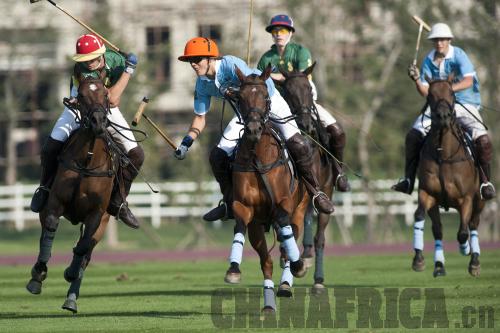|
 |
|
MY BALL:Polo players in Tianjin, China |
During China's week-long National Day holiday this October, polo players hailing from all over – South Africa, Argentina, the United States and England - showed off their superb skills in the city of Tianjin, which lies about 140 km southeast of the capital of Beijing. The kicker? They were all under 18 - budding sportsmen there to compete in an international youth tournament.
In recent years, there have been several international polo competitions held in China. Although few Chinese players participate, the matches are attracting a monied audience all the same.
The challenge of revival
Though many at the top of Chinese society are starting to embrace polo for its exoticism, in actuality, their ancestors were very familiar with the sport.
In ancient China polo was called jiju, and was popular during the Tang Dynasty (618-907). Favored by emperors, nobles and high officials, it served as both an entertaining sport and a military exercise for the army. The fever lasted until the Qing Dynasty (1644-1911) when the sport's popularity gradually declined. Polo now faces a new challenge in modern China: revival. And revival is by no means easy.
Out of the spotlight in China for hundreds of years, polo now has a reputation in the country as a "modern European-style luxury." This label adds to its appeal, but also alienates Chinese audiences. Polo's link to China's historic aristocracy plays little role even as people begin to identify more with European culture.
Simon Stafford, a British journalist working in Beijing, said polo is a sport with rich culture, but even in Britain most people cannot understand what exactly it is about.
As a pure competitive sport, polo is starting from scratch in China.
"Equestrian sport has developed well in China since it became a part of the Olympic Games," said Paul Yi, an editor at China Horsemanship Magazine. "But polo is still at the very beginning. We don't have a national team, and professional players around the country are few."
Promotion in China
Currently in China, a growing number of people enjoy watching polo but not many will ride or play. Polo is doomed to have a tougher path to fame than golf. The reason is simple: Everyone can play golf, but polo, which requires a high skill level, intimidates a lot of people.
"It's a very dangerous sport. There are a lot of skills involved," explained Deidre Van Reene, the mother of a South African player. "You have to be able to ride very well, and be able to hit the ball at full speed with a lot of skill."
Those, however, cannot stop the sport's climb in popularity in the country. In spite of the difficulties, Chinese investors believe in polo's potential to lead a newborn industry. They are promoting polo in China in a new way.
"Polo in China is a lifestyle," said Harvey Lee, Vice Chairman of the Metropolitan Polo Club, the first of its kind in Tianjin. Polo clubs have had a Chinese presence since 2004. There are several others around Beijing, Shanghai and in other areas in the south of the country.
"It's a social sport more than a competitive sport," said Lee. "Our members do not have to take a keen interest in the sport. We invite best teams to play here. Members can get to know different people and expand their circles through watching games."
Meanwhile, the club also has a plan to sow more seeds. A training camp offered to youngsters may be a cradle for future polo players.
Huge costs keep the circle small, but Lee believes that it has the full potential to expand.
"The market is big. We have only advanced five or six steps on a hundred-step ladder," Lee said. He's confident about a bright future. |